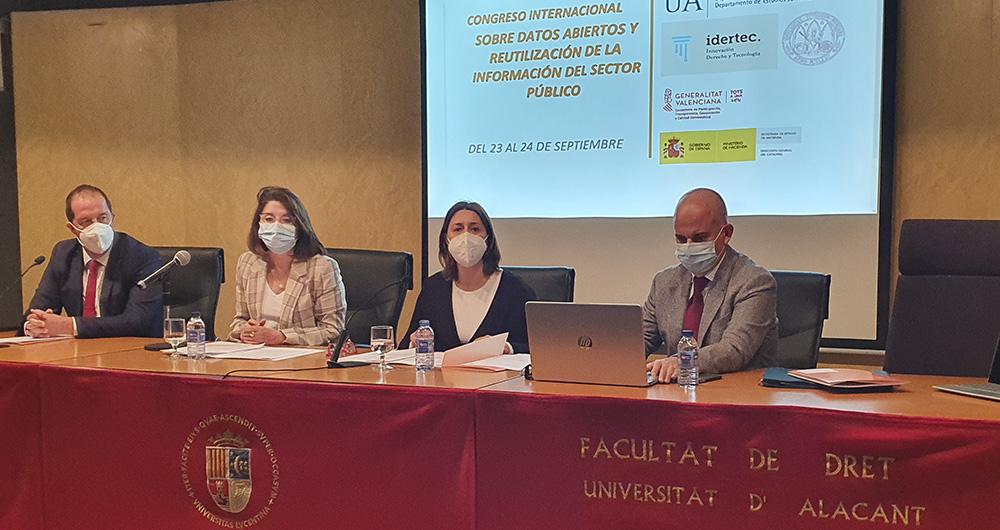
Last September, an international congress was held at the University of Alicante, which addressed some of the main challenges posed by open data and the reuse of public sector information from a legal perspective.
The inaugural conference was given by Kiko Llaneras, who made, from his own journalistic experience, a suggestive presentation on the role played by data in the communication processes during the management of the pandemic. Specifically, he explained that almost 20% of the most read news items during the pandemic were stories based on data. In his opinion, this is a trend that goes beyond circumstantial reasons and is due to a greater interest in this type of methodology, particularly in making the understanding of complex subjects more accessible. The speaker concluded by emphasizing the need to make data available in better conditions in terms of their accessibility, the formats in which they are available, their updating and their integration when they come from different sources.
The first round table of the congress was dedicated monographically to the field of tourism. Despite the efforts and progress that have been made in this essential area of the Spanish economy, the speakers highlighted two challenges still to be addressed with regard to the promotion of open data. On the one hand, the information made available by public entities is fragmented and heterogeneous, not only because of the plurality of the datasets published but, above all, because of the difficulties of integrating their automated processing; difficulties that are increased with regard to data with tourist relevance offered by private sector entities - search engines, social networks, information society service providers which, as is evident, are not subject to legislation on open data and reuse of public sector information. On the other hand, the difficulties encountered by many of the municipalities, largely due to their limited material and human resources, were highlighted when it comes to committing to advanced tourism management based on data management, which requires the support and assistance of the State and the Autonomous Communities in particular if the aim is to encourage the opening of data in this sector.
The second round table addressed the challenges posed by open data and the reuse of information in the field of public sector procurement, with a special focus on the proposal to incorporate this area into the categories of high-value data. Even though the establishment of an unavoidable legal obligation to use open and reusable formats was an important step forward in terms of contractor profiles and procurement platforms, the need to advance in the implementation of this important measure was highlighted during the debate. On the other hand, the limited scope of the legal regulation was noted, since it does not cover the entire contracting process, since it does not reach the phase related to the execution of the contract, which undoubtedly represents a major obstacle when it comes to facilitating not only accountability but also the dynamization of the market in this important economic sector. Finally, among other pending issues, emphasis was placed on the suitability of an eventual establishment of common criteria for document management by the numerous and diverse bodies and entities subject to the Public Sector Contracts Law, so as to pave the way towards a specific standardization in this sector, a necessary condition for the full integration of data when it is intended to reuse them to provide value-added services at the state or European level.
The third round table was devoted to reviewing the singularities in the field of the environment, urban planning and land use planning. In this respect, the environmental sector was highlighted, given its traditional legal regime, especially reinforced in terms of the possibilities of access to information, a regulation that undoubtedly explains why open data has a relevant potential when facing the most complicated challenges, as demonstrated by the existence of interesting specific applications. In general terms, and from a legal point of view, it was emphasized that these are sectors characterized by a significant technical component, so that open data have an undeniable value, particularly in terms of strengthening the possibilities of control by citizens and also in terms of their effective participation in these matters.
Finally, the congress closed with an international round table, which analysed the regulation of open data in several European Union States, showing that the process of transposition of Directive 2019/1024 is being irregular and, in fact, most of the European Union States have not yet approved their own regulations. Furthermore, one of the main new features of the Directive, the identification of high-value data, which is undoubtedly a tool that will play an essential role, has yet to be implemented by the European Commission.
In short, the speeches and debates that took place during the Congress showed the need to make a firm commitment to a public management model in which data and, in particular, its openness and the consequent possibility of its reuse, take on a greater role. All of this is consistent with the possibilities of digital transformation enabled by the technology available to meet the major challenges that lie ahead in the immediate future.
Content prepared by Julián Valero, Professor at the University of Murcia and Coordinator of the Research Group "Innovation, Law and Technology" (iDerTec).
The contents and views expressed in this publication are the sole responsibility of the author.